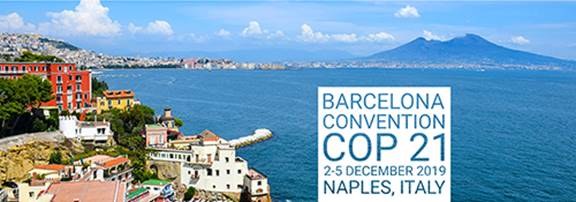MED News 01/2019
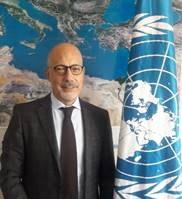 Editorial
Editorial
By Gaetano Leone, Coordinator, UNEP/MAP – Barcelona Convention Secretariat
The time is ripe for decisive action to accelerate the transition to sustainability in the Mediterranean. As we collectively prepare for the 21st Meeting of the Contracting Parties to the Barcelona Convention (COP21), let us to take a moment to reflect on what the Mediterranean Action Plan – Barcelona Convention system has accomplished thus far and on what we can do to turn the tide on environmental degradation. The Contracting Parties have built a comprehensive legal and institutional framework encompassing key building blocks for sustainability in the Mediterranean. The network of Regional Activity Centres is providing our community with the required scientific and technical expertise to move forward. What can we do more to ensure that these achievements can translate into a decisive shift to sustainability in the Mediterranean? At this stage, the answer to this question is two-fold: compliance with and full implementation of the Barcelona Convention and its Protocols. The Coordinating Unit of the UN Environment/MAP will continue to support Contracting Parties and Partners to make the much-needed progress on capacity-building and resource-mobilization in these areas. But let us remember that the Barcelona Convention is much more than a legal text: it epitomizes the essence of multilateralism and basin-wide solidarity that constitute our greatest strength.
15 July 2019
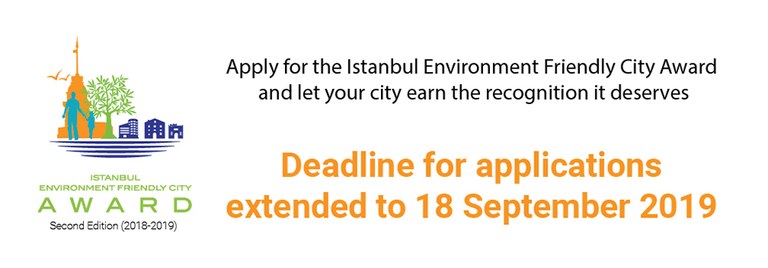
ISTANBUL ENVIRONMENT FRIENDLY CITY AWARD
LAST CALL FOR APPLICATION FROM MEDITERRANEAN COASTAL CITIES
UNEP/MAP is pleased to inform you that the deadline for the submission of applications for the Istanbul Environment Friendly City Award has been extended until 18 September 2019. We encourage a broad participation from Mediterranean coastal cities ...
UNEP/MAP is pleased to inform you that the deadline for the submission of applications for the Istanbul Environment Friendly City Award has been extended until 18 September 2019. We encourage a broad participation from Mediterranean coastal cities and towns.
Funded by the Government of Turkey, the Istanbul Environment Friendly City Award was created in the framework of the Mediterranean Strategy for Sustainable Development (MSSD) to recognize efforts of local authorities in promoting sustainable development in Mediterranean coastal cities.
Eligibility
Cities located along the Mediterranean coast are invited to apply by demonstrating concrete steps taken and progress achieved to protect the environment, improve the quality of life, and promote sustainable development, in line with the priorities of the Mediterranean Action Plan and the principles enshrined in the Barcelona Convention.
Applications submitted by local authorities should emphasize partnerships with civil society, the scientific community and the private sector, including projects aimed at promoting urban sustainability. Both achievements and plans for strengthening urban sustainability in a coastal context will be considered.
Application checklist
- Complete the application form
- Include the signature of the mayor (or legal representative), or provide an official letter from the local authority supporting the application
- Submit in PDF and MS Word to Julien.Letellier@un.org – copy to Irene.Cavoura@un.org by 18 September 2019.
Timeline
- Application deadline: 18 September 2019
- Selection notification: November 2019
- Award ceremony: the ceremony will take place during the Ministerial Session of the 21st Ordinary Meeting of the Contracting Parties to the Barcelona Convention (COP 21) to be held in Naples, Italy, on 2-5 December 2019.
For more information:
Please refer the following background documents:
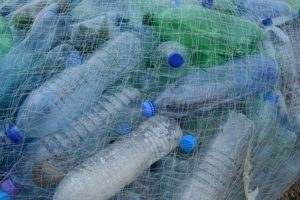
The SwitchersFund presents THE UNWRAP AWARD, a collaboration between SCP/RAC and Innovations Nest to prevent plastic packaging in the Balkans region
Innovation Nest has just launched an open call for the regional challenge for the prevention and reduction of single-use plastic packaging in the food and beverage sector in Albania, Bosnia and Herzegovina and Montenegro
We welcome you to join us on this big challenge, to unwrap the future of food and beverage! It is estimated that around 278.000 tons of F&B plastic packaging is used in Albania, Bosnia and Herzegovina and Montenegro (WB3) every year, the F&B sector ...
We welcome you to join us on this big challenge, to unwrap the future of food and beverage! It is estimated that around 278.000 tons of F&B plastic packaging is used in Albania, Bosnia and Herzegovina and Montenegro (WB3) every year, the F&B sector is key in the national economies and offers great opportunities, including exports. The situation calls for action at different levels and offers entrepreneurship possibilities.
The challenge addresses directly the food & beverage industry, packaging solutions and business models for tackling plastic packaging value chains in a circular economy, and will reduce negative effects of plastic leakage into the environment as a main contribution, while keeping the plastic material in a closed loop. Emerging businesses will receive support to develop further their products and drive F&B industry to a more sustainable development. The market of WB3 involved in this important challenge will increase the knowledge and innovation capability, allowing for greater modernization and larger markets outreach. We strongly believe that the challenge-award approach promotes critical and creative thinking skills that are key in finding solutions.
The ‘Unwrap’ challenge is awarded by the SwichersFund an initiative led by SCP/RAC and Innovation Nest (INN), a dynamic Business Support Organization in the Balkans region and it invites entrepreneurs, individuals, organizations or SMEs to identify and commercialize existing and new solutions to packaging needs of the F&B sector in WB3.
We encourage you to find out more on https://www.theswitchersfund.eu/en/the-award/
Applications will be accepted until: July 25th, 2019, at 12PM.
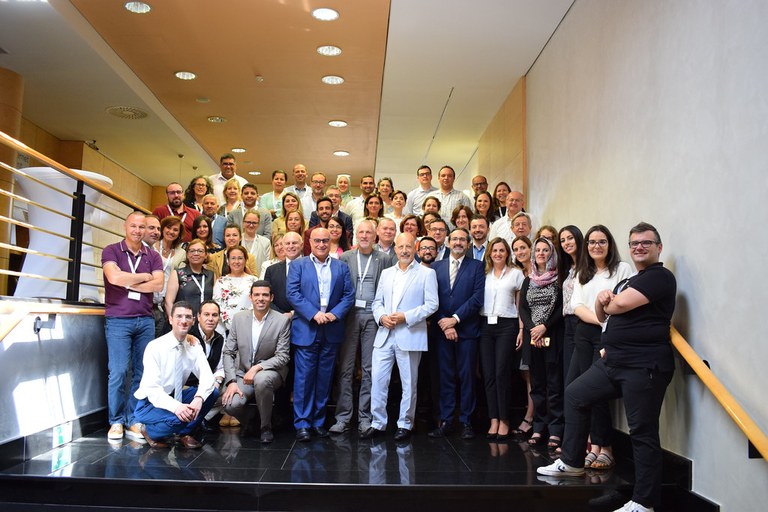
UN Environment/MAP Coordinator attended the SPA/RAC thematic focal points meeting for Specially Protected Areas and Biological Diversity
UN Environment/MAP Coordinator Gaetano Leone attended the 14th meeting of the thematic focal points for Specially Protected Areas and Biological Diversity held in...Read more
UN Environment/MAP Coordinator Gaetano Leone attended the 14th meeting of the thematic focal points for Specially Protected Areas and Biological Diversity held in...Read more
Meeting of the Focal Points of MED POL (Istanbul, Turkey, 29-31 May 2019)
The meeting hosted by Turkey reviewed and acknowledged progress achieved in the implementation of the MAP Programme of Work (PoW) on land-based sea pollution. Focal Points reviewed the status of...Read more
The meeting hosted by Turkey reviewed and acknowledged progress achieved in the implementation of the MAP Programme of Work (PoW) on land-based sea pollution. Focal Points reviewed the status of...Read more
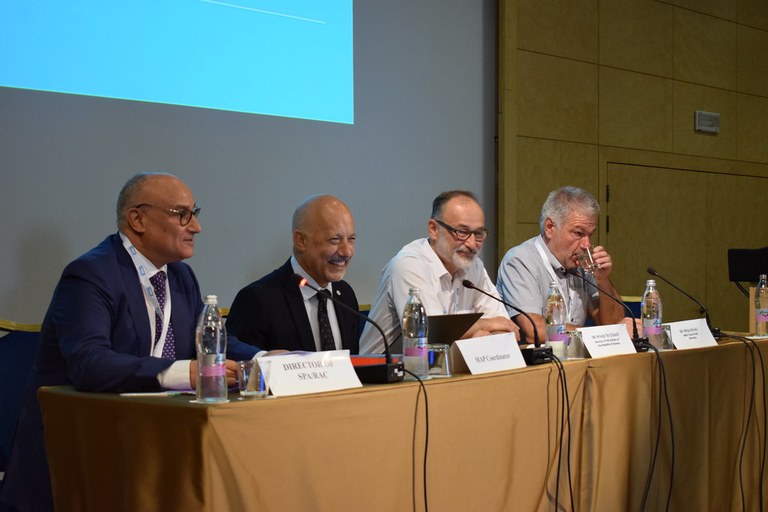
Mediterranean countries discuss the conservation of marine biodiversity in the Region
The Thematic Focal Points for Specially Protected Areas and Biological Diversity, representing the Mediterranean countries and the European Union, held their 14th meeting in Portorož, Slovenia, from 18 to 21 June 2019
Representatives of 20 Contracting Parties to the Barcelona Convention were present at the Meeting, as well as many partners (ACCOBAMS, RAMOGE, HCMR, IUCN-Med, IOGP, MEDASSET, MedPAN, The MedFund, The Shark Trust, Shark Advocates International, ...
Representatives of 20 Contracting Parties to the Barcelona Convention were present at the Meeting, as well as many partners (ACCOBAMS, RAMOGE, HCMR, IUCN-Med, IOGP, MEDASSET, MedPAN, The MedFund, The Shark Trust, Shark Advocates International, WWF-MedPO) and the MAP Coordinator.
This 14th edition differs from the previous ones by the involvement of MAP Focal Points and other MAP components. Indeed, seven MAP Focal Points participated in the meeting, as well as representatives of INFO/RAC, PAP/RAC and REMPEC. The purpose of this initiative was to test the "thematic" way of organizing the meeting with the integration of horizontal topics of the MAP Mid-Term Strategy with the Specially Protected Areas and Biological Diversity theme.
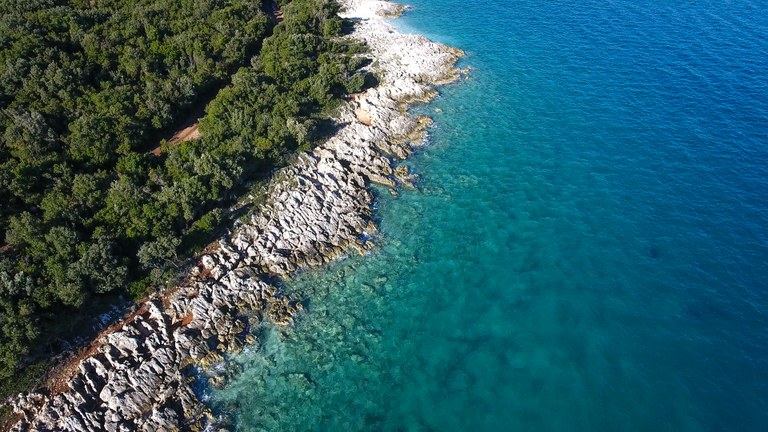
SCP/RAC just signed a promising agreement with Albania to tackle marine litter sources in the Karaburun-Sazan MPA
An encouraging agreement had just been signed between SCP/RAC and the Regional Administration of Protected Areas in Vlora (RAPA) on the development of an action plan and the implementation of a measure to tackle marine litter sources in ...
An encouraging agreement had just been signed between SCP/RAC and the Regional Administration of Protected Areas in Vlora (RAPA) on the development of an action plan and the implementation of a measure to tackle marine litter sources in Karaburun-Sazan National Marine Park.
This agreement is made within the framework of the Cooperation Agreement between UN Environment/MAP and IMELS (Italian Ministry of Environment Land and Sea) signed in September 2016 and under which SCP/RAC develops a series of activities, some of which relates to the prevention of Marine Litter and in particular food and beverage packaging.
SCP/RAC, together with RAPA, will identify the best measure to prevent marine litter in Karaburun-Sazan MPA and will work on its successful implementation before the end of this year.
Based on the previous project developed in the area, 3 possible measures have been identified:
- Plastic waste collection and disposal system at beach areas (beach bars)
- Collection and disposal of Marine Litter (fishing for litter scheme with artisanal fisherman)
- Deposit-refund system scheme for Aquaculture waste
This activity will build on the methodology developed during the Interreg Med funded ACT4LITTER project, finalized in October 2018 and led by SCP/RAC.
The ACT4LITTER project facilitated efforts for tackling marine litter in Mediterranean MPAs through the development of effective and targeted measures towards reaching their conservation objectives via an ecosystem-based approach.
The SCP/RAC’s team is looking forward to starting the collaboration and undertaking actions in the MPA!
More Marine Litter prevention and mitigation measures will be implemented in Mediterranean MPAs by SCP/RAC through the Interreg Med funded Plastic Busters MPAs project. Stay tuned!
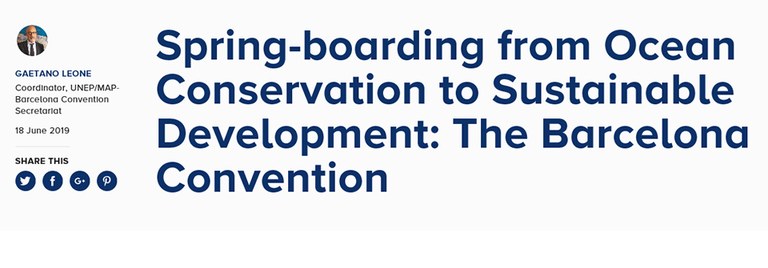
“Spring-boarding from Ocean Conservation to Sustainable Development: The Barcelona Convention” – by Gaetano Leone, UN Environment/MAP Coordinator
The Barcelona Convention has played a pioneering role in the family of Regional Seas Conventions. The Barcelona Convention’s Regional Plan on Marine Litter Management is the first ever legally...Read more
The Barcelona Convention has played a pioneering role in the family of Regional Seas Conventions. The Barcelona Convention’s Regional Plan on Marine Litter Management is the first ever legally...Read more
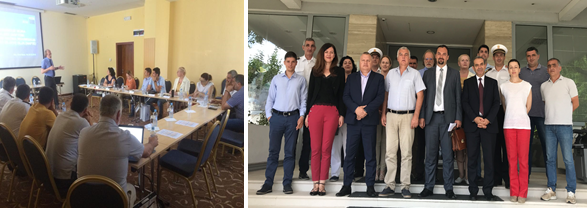
National oil spill response training course (IMO OPRC Model Course, Level 2) delivered by REMPEC in Montenegro
To ensure prompt and efficient response, training and practice are essential in any field, in particular when dealing with an emergency situation. This need is clearly reflected in Article 6 of the OPRC 1990 Convention, which calls for the ...
To ensure prompt and efficient response, training and practice are essential in any field, in particular when dealing with an emergency situation. This need is clearly reflected in Article 6 of the OPRC 1990 Convention, which calls for the establishment of programmes to train relevant personnel in oil spill preparedness and response.
REMPEC delivered from 19 to 21 June 2019, a National oil spill response training course (IMO OPRC Model Course , Level 2) in Bar, Montenegro, aimed at supervisors and On-Scene Commanders, to prepare national competent authorities to co-ordinate and manage the response and make decisions on response strategies and tactics to be used in clean-up operations.
This capacity building activity is part of a larger plan to protect Montenegro and the Adriatic against adverse effects of oil spills, which started with the support of REMPEC in the drafting of the National Contingency Plan adopted in April 2011, and which will follow with the preparation of the “Adriatic Sub Regional Oil Spill Contingency Plan (ASOSCoP)” within the EU Strategy for the Adriatic-Ionian Region (EUSAIR), as discussed during the IMO-supported 4th edition of the Adriatic Oil Spill Conference (ADRIASPILLCON 2019), held in Opatija, Croatia (28-30 May). These developments are encompassed in a wider approach supported by IMO and REMPEC, through the preparation of the National Action Plan of Montenegro for the implementation of the Regional strategy for prevention of and response to marine pollution from ships (2016-2021).
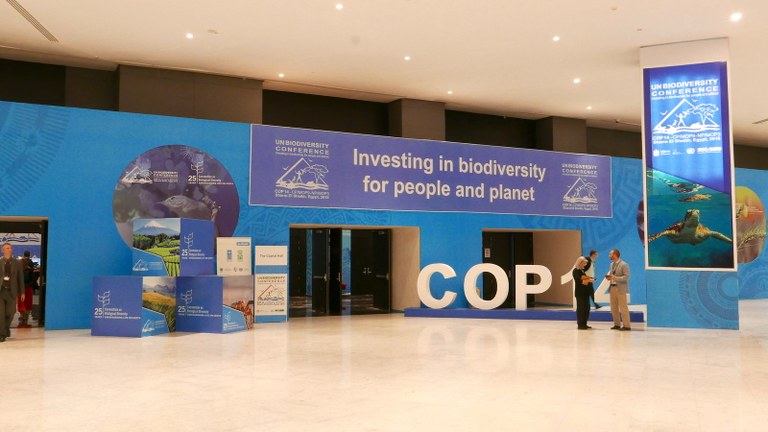
A look back at the CBD COP 14
The 14th Conference of the Parties to the Convention on Biological Diversity (CBD) was held at Sharm-al-Sheikh in Egypt, between the 17th and 29th November of 2018, marking the very first time that the conference had been held in the Middle East. ...
The 14th Conference of the Parties to the Convention on Biological Diversity (CBD) was held at Sharm-al-Sheikh in Egypt, between the 17th and 29th November of 2018, marking the very first time that the conference had been held in the Middle East. The event attracted a total of 3,800 participants from various countries and walks of life, such as governmental and non-governmental organisations, academia, and private sector.
What is the COP CBD and Why Does it Matter?
The Convention on Biological Diversity first came into being on the 22nd of May, 1992. The CBD was soon opened up for signature on the 5th of June, 1992. This was done at the UN Conference on Environment and Development, also known as the Rio “Earth Summit”.
The CBD soon entered into a working and administrative position, soon gathering a number of different people and parties under its umbrella. As of now, there are a total of 196 different parties who are part of the convention, which has its aim defined as the conservation of biodiversity, its sustainable usage, and a just and equitable distribution of all the benefits that human beings receive from nature.
The Conference of the Parties is the main governing body of the Convention with three different bodies meeting regularly for that purpose. They are the Subsidiary Body on Scientific, Technical, and Technological Advice (SBSTTA), the Working Group on Article 8(j) (traditional knowledge), and its relevant provisions, as well as the Subsidiary Body on Implementation (SBI).
Over the years, the CBD has led to a number of key decisions towards the protection of biodiversity, including:
- The Jakarta Mandate on Marine and Coastal Biological Diversity (COP 2, November 1995, Jakarta, Indonesia);
- A resource mobilization strategy, and scientific criteria and guidance for marine areas in need of protection (COP 9, May 2008, Bonn, Germany);
- The Strategic Plan for Biodiversity 2011-2020, including the Aichi Targets, and a decision on activities and indicators for the implementation of the resource mobilization strategy (COP 10, October 2010, Nagoya, Japan).
These are just a few of the major achievements made over the years in the framework of the CBD and COP aiming to turn the war against irreparable biodiversity damage.
Overview on the CBD COP 14 Conclusions
Post-2020 preparatory process under the Convention: The Conference set up an intersessional open-ended working group (OEWG) on the post-2020 global biodiversity framework.
Spatial planning, protected areas, and other effective area-based conservation measures (OECMs): Delegates underlined the lack of adequate human, financial, and administrative resources slowing the progress of Protected Areas integration and mainstreaming. In the decision (UNEP/CBD/COP/14/L.19), the COP encourages the parties to apply the voluntary guidance on the integration of protected areas and OECMs into wider land- and seascapes and mainstreaming across sectors to contribute, inter alia, to the SDGs.
Marine Litter and underwater noise: In the decision (UNEP/CBD/COP/14/L.24), the COP urges parties to increase their efforts aimed at:
- avoiding, minimizing, and mitigating the impacts of marine debris, in particular plastic pollution, on marine and coastal biodiversity and habitats;
- addressing the potential impacts of deep-seabed mining on marine biodiversity; and
- protecting biodiversity in cold-water areas.
Climate change and ecosystem-based approaches: In the decision (CBD/COP/14/L.23), the COP expresses deep concern over failure to hold temperature increase well below 2°C above pre-industrial levels and emphasizes the importance to maintain the integrity of ecosystems. The voluntary guidelines for the design and effective implementation of ecosystem-based approaches (EbA) to climate change adaptation and disaster risk reduction (Eco-DRR) were adopted. The voluntary guidelines are intended to be used as a framework for planning and implementing EbA and Eco-DRR.
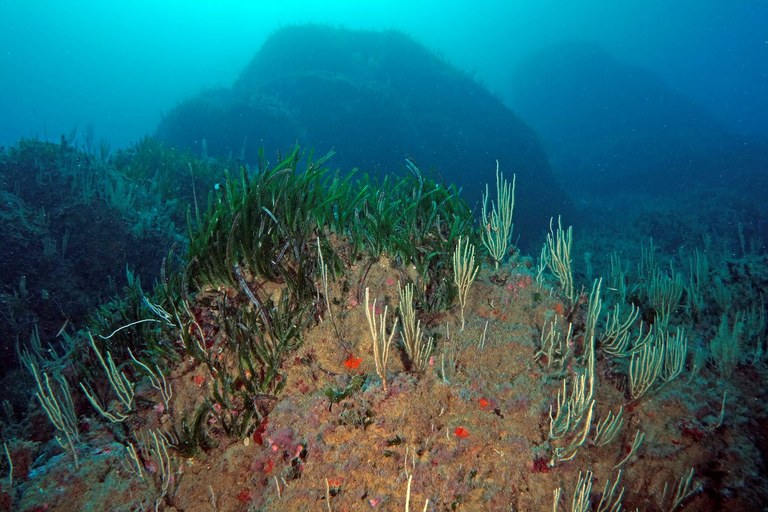
Interview with Chedly Rais in Light of the Conference of Parties on Conservation of Biodiversity
The fourteenth meeting of the Conference of the Parties (COP 14) to the Convention on Biological Diversity, held in Sharm el-Sheikh, Egypt, delivered a number of decisions that would guide future conservation drives and methods.
We were able to ...
The fourteenth meeting of the Conference of the Parties (COP 14) to the Convention on Biological Diversity, held in Sharm el-Sheikh, Egypt, delivered a number of decisions that would guide future conservation drives and methods.
We were able to interview Mr. Chedly Rais, a Mediterranean ecologist and marine diversity expert. Mr. Chedly Rais had a number of interesting ideas to share.
Question/ While there are many reasons to be concerned about the marine environmental status worldwide, are there some reasons to be optimistic about the world's oceans in 2019, and concerning the Mediterranean Sea in particular?
Reply/ There are reasons to be optimistic for the future of the oceans in 2019, but without any significant hope for results. Indeed, even though the evolution towards an improvement of the status of oceans and the reduction of threats they face are slow, many countries have engaged in promising initiatives for 2019.
At the Mediterranean level, the marine strategy launched by the European Union for its member countries is particularly interesting. It aims to achieve the Good Environmental Status while addressing several different aspects, fostering the integration of the ecosystem approach to achieve more tangible and sustainable results.
There is one point to note, however, that if the reasons for optimism exist for certain domains or regions, it is unrealistic to be optimistic for others. This is notably the case with climate change. The effects of which are becoming more and more perceptible while the pace of measures taken for its mitigation is insufficient to suggest positive results in the immediate future.
The same goes for the accumulation of plastic litter in the oceans and the threats brought about by microplastics, along with underwater noise. For both issues, it is difficult to be optimistic about the countries' response to them.
The evolution of MPAs in the world and in the Mediterranean is a reason for optimism. Indeed, following the global call through the CBD Aichi targets, a visible effort can be seen all around the world for the deployment of more MPAs. There is also a great effort underway to improve the management of MPAs and to further integrate them into the socio-economic context of the regions and places where they have been deployed.
The next CBD COP will be called to define a post-2020 framework for biodiversity conservation. It is important that the Mediterranean region adheres, via its countries, to this process that was launched last year to support and define this framework.
Question/ If there were to be 3 actions to undertake in 2019 to address the growing fragility of marine ecosystems in the Mediterranean, what could they be?
Reply/
- Launch a major initiative to be more knowledgeable about and safeguard the Mediterranean deep-sea This would involve undertaking field campaigns to improve the knowledge on the marine deep habitats in the Mediterranean. The results of the campaign should be then used to take action. This includes the establishment of MPAs in regular areas and the ABNJs [Areas Beyond National Jurisdiction].
- Finalize an Atlas of Posidonia oceanica meadows and work to obtain each and every Mediterranean region country’s commitment to create MPAs to protect 25% of the meadows coverage.
- Develop and adopt an action plan to reduce the impact of plastics on biodiversity.
Mr. Rais predictions for the future show a pragmatic approach to the idea of marine conservation and protecting of biodiversity. Although the CBD has been successful to a degree (as seen in the figure below) ever since the first COP meeting in 1993, there still exist various areas where they need to focus on. Many conservationists advocate to establish more effectively managed MPAs and have a more integrated approach to marine biodiversity conservation. However, as Mr. Rais points out, that can only happen if the relevant parties take the necessary steps to implement the existing framework.
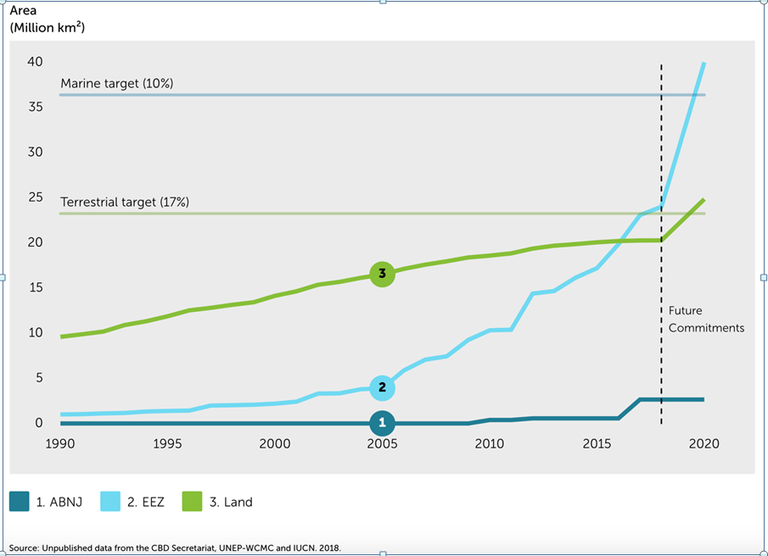
Growth in protected areas coverage on land and in the ocean
The following figure shows growth in protected areas coverage on land and in the ocean (EEZ and ABNJ) between 1990 and 2018 and projected growth to 2020 according to commitments from countries and territories.
MPAs have increased more than 15-fold since 1993 when the CBD entered into force.
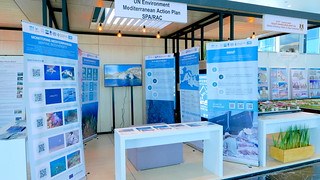
SPA/RAC & INFO/RAC Stand at COP14 CBD
SPA/RAC and INFO/RAC participated in the CBD COP 14 to share the Mediterranean experience in terms of biodiversity protection. A stand was set up throughout the duration of the COP 14 to inform on the the Integrated Monitoring and Assessment ...
SPA/RAC and INFO/RAC participated in the CBD COP 14 to share the Mediterranean experience in terms of biodiversity protection. A stand was set up throughout the duration of the COP 14 to inform on the the Integrated Monitoring and Assessment Programme (IMAP) and the EcAp-MED II project.
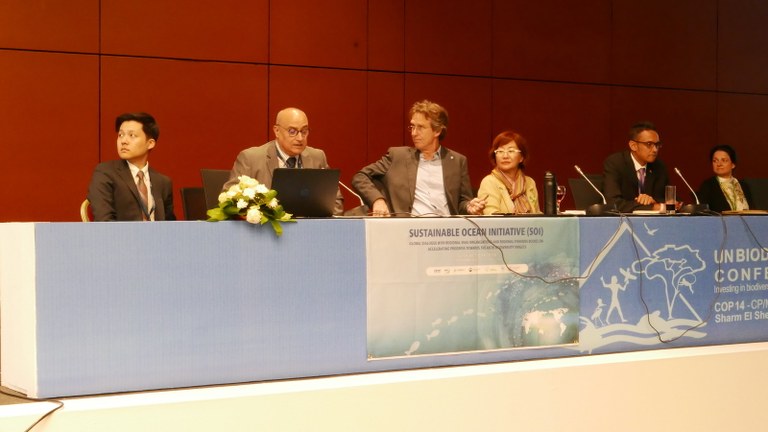
The SPA/RAC’s Contributions to the COP 14 Convention for Biological Diversity
The recently held Conference of Parties (COP 14) of the CBD in Egypt was attended by a total of 3,800 participants, representing numerous occupations and backgrounds. The theme and subject of importance for the Convention were the protection of ...
The recently held Conference of Parties (COP 14) of the CBD in Egypt was attended by a total of 3,800 participants, representing numerous occupations and backgrounds. The theme and subject of importance for the Convention were the protection of biodiversity in the World as well as the involvement of the local population in the conservation of resources and biodiversity. Along with the different plenary events that took place in the Convention, there were some side events on show as well.
Some of these side events were organized, by the UN Environment/MAP-SPA/RAC in conjunction with the Egyptian Environmental Affairs Agency (EEAA) and other relevant regional partners, in order to discuss the importance of marine life in the Mediterranean along with the steps being taken to conserve it, including:
The Barcelona Convention and What It Offered in Egypt
The Barcelona Convention provides a regional cooperation framework for promoting the conservation of marine and costal biodiversity in the Mediterranean Sea.
At the CBD COP 14, SPA/RAC presented the work currently being done to conserve the biodiversity of the Mediterranean coasts of Egypt, especially the activities undertaken within the MedMPA Network project, funded by the European Union, to develop the network of marine protected areas, as per the aims and priorities of the Barcelona Convention.
At the event, the main talks included discussing future actions, with insight being offered into what might come next and exactly what might be needed beyond 2020 in order to keep the Barcelona Convention’s programmes in line with global agenda and targets, in particular those related to SDG 14 and Aichi Biodiversity Target 11. This includes the need to further support the implementation of the ecosystem approach and its integration in the environmental policies.
Global Dialogues on Sustainable Ocean Initiatives
The Sustainable Ocean Initiative (SOI) is a United Nations global platform to build partnerships and enhance capacity to achieve the Aichi Biodiversity Targets to which the UN Environment/MAP-SPA/RAC has been actively contributing, as it aims to provide a sustainable and long-lasting solution for marine life preservation. The Sustainable Ocean Initiative has been launched, handled, and promoted particularly to meet the Aichi Biodiversity Target 11 at sea, with many major outcomes currently being planned or being operated.
At the CBD COP14, SPA/RAC contributed to the promotion of the global dialogue involving Regional Fisheries Bodies and Regional Sea Organizations, thus supporting SDGs 6, 11 and 14 while aiding to reach Aichi Target 11. This included presenting the Mediterranean experience in a cross-sectorial collaboration, in particular between UN Environment/MAP – Barcelona Convention and the FAO General Fisheries Commission for the Mediterranean. This dialogue and attention oriented towards regional participation allowed to achieve some tangible results and to produce key outcomes.
Generating Marine Data and Services for North Africa
In order to protect marine life and the human activities that depend on it, the support of the national authorities and local people may be required. Many countries in North Africa lack of observatories to collect real time marine data and the associated services of data processing and modelling. That is something SPA/RAC has been focusing on, with COP 14 providing a perfect opportunity to showcase more of this activity undertaken in the framework of the ODYSSEA project financed by European Union's Horizon 2020 research and innovation programme.
With hosts UNEP-WCMC | SPA/RAC | RAED | Deltares combining to lead the event, there was a general focus on innovation and solutions that can make a difference. The general topic of discussion was offering better marine data and services to facilitate better decision making in the North African region and the Mediterranean in terms of ecosystem management and human activities. With accurate data available on demand, through an interoperable platform linking data and services from at least nine Mediterranean observatories, this objective becomes easier to achieve.
An Ecosystem Approach to the Conservation of Biodiversity in the Mediterranean
Applying the Ecosystem based management (EBM) to protect biodiversity was one of the topics where SPA/RAC participated in through a side event during COP 14. The event organized by UfM - ETC-UMA with the participation of SPA/RAC discussed a number of topics that focused on EBM tools and policy processes to address transboundary and cumulative impacts in the Mediterranean of marine plastic litter and climate change.
Ecosystem based management case studies were presented during the event. The meeting welcomed exchanges among Mediterranean stakeholders – managers, policymakers, socioeconomic actors, civil society and the scientific community, and highlighted processes to ensure their active engagement, allowing for a balance between ecological, economic, and social aspects.
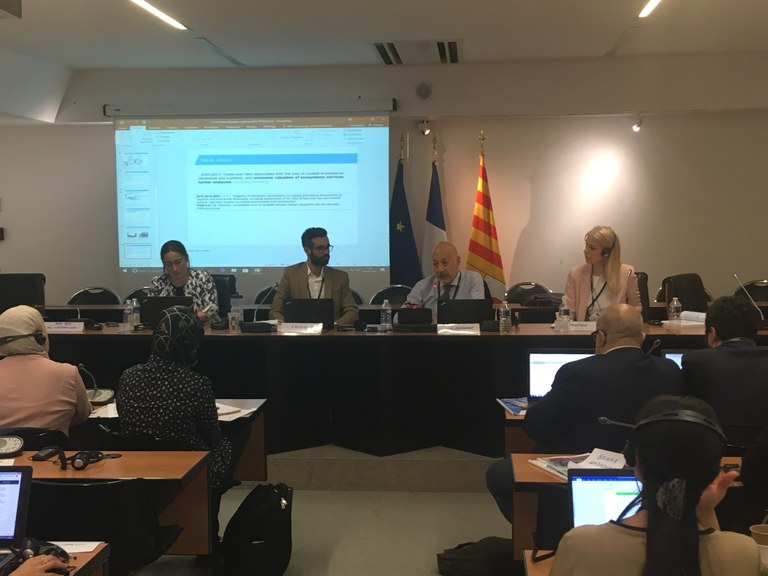
Plan Bleu National Focal Points Meeting
The National Focal Points of Plan Bleu - Regional Activity Centre were gathered from 27 to 29 May 2019 in Marseille (France) in order to examine the implementation of Plan Bleu’s Programme of work for the biennium 2018-2019 and to discuss and ...
The National Focal Points of Plan Bleu - Regional Activity Centre were gathered from 27 to 29 May 2019 in Marseille (France) in order to examine the implementation of Plan Bleu’s Programme of work for the biennium 2018-2019 and to discuss and approve the proposed Programme of work for the biennium 2020-2021, prior to its submission to the Meeting of the Focal Points of the Mediterranean Action Plan (10-13 September 2019) and to the Twentieth Ordinary Meeting of the Contracting Parties to the Barcelona Convention and its Protocols (2-5 December 2019) for adoption.

Signature of the contract by Adriatic Training and Research Centre (ATRAC) and REMPEC to join the Mediterranean Assistant Unit
The Thirteenth Meeting of the REMPEC Focal Points, on the occasion of the 25th Anniversary of the establishment of the Mediterranean Assistance Unit (MAU) congratulated and welcomed the signing of the agreement with its sixth member, namely the ...
The Thirteenth Meeting of the REMPEC Focal Points, on the occasion of the 25th Anniversary of the establishment of the Mediterranean Assistance Unit (MAU) congratulated and welcomed the signing of the agreement with its sixth member, namely the Adriatic Training and Research Centre for Accidental Marine Pollution Preparedness and Response (ATRAC).
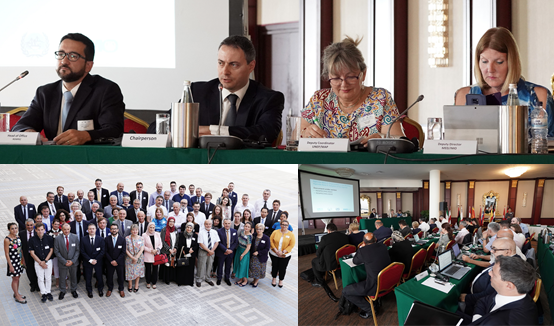
13th Meeting of the Focal Points of the Regional Marine Pollution Emergency Response Centre for the Mediterranean Sea (REMPEC)
With its strategic location, the Mediterranean Sea is host to important transit lane and transhipment activities for international shipping and has seen a significant and rapid raise in cruise ship movements over the last two decades, becoming the ...
With its strategic location, the Mediterranean Sea is host to important transit lane and transhipment activities for international shipping and has seen a significant and rapid raise in cruise ship movements over the last two decades, becoming the second biggest cruising region in the world. To face adverse impacts on human health and ecosystems of maritime activities, over 80 participants from 19 Mediterranean coastal States and European Union, as well as the International Maritime Organization (IMO) and the United Nations Environment Programme (UNEP), other governmental and non-governmental organizations, the industry and associations, met in Malta, from 11 to 13 June 2019 to address a wide range of technical issues and strategic decisions issues.
The Rempec Focal Points Meeting notably agreed:
• to continue developing and strengthening pollution response capacity and cooperation at national, sub-regional and regional levels;
• to launch a wide consultation process to prepare the draft post-2021 Mediterranean Strategy for Prevention of and Response to Marine Pollution from Ships;
• to explore and establish synergies between the Regional Plan on Marine Litter Management in the Mediterranean and the IMO Action Plan to address marine plastic litter from ships;
• in principle to further examine the possibility of designating the Mediterranean Sea area as an Emission Control Area for Sulphur Oxides under MARPOL Annex VI; and
• on the need to define a sustainable and collaborative approach to implement effectively the Offshore Protocol and its Action Plan.
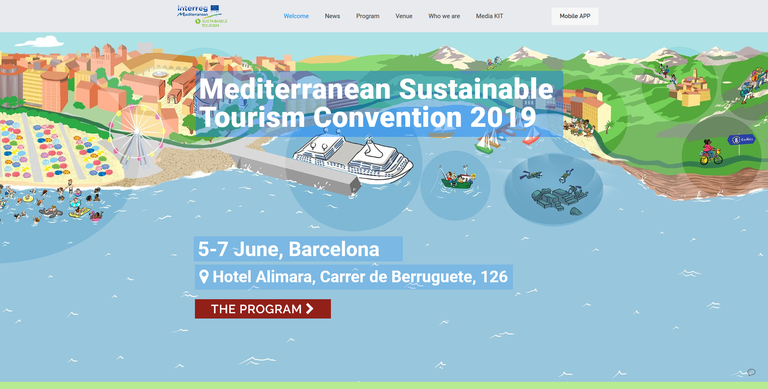
Final Conference of the MED Sustainable Tourism Community
On the 5th – 7th June 2019, the MED Sustainable Tourism Community gathered in Barcelona on the occasion of the Mediterranean Sustainable Tourism Convention 2019 to debate the tourism sector’s contribution to a more sustainable and inclusive growth ...
On the 5th – 7th June 2019, the MED Sustainable Tourism Community gathered in Barcelona on the occasion of the Mediterranean Sustainable Tourism Convention 2019 to debate the tourism sector’s contribution to a more sustainable and inclusive growth in the Mediterranean region. Panel discussions, round tables, workshops, side events and sites visits, showcased how territorial projects of the Interreg MED Sustainable Tourism Community can help in preserving the unique landscapes and precious resources of the Mediterranean by promoting a sustainable tourism.
Plan Bleu, as partner of BleuTourMed, organizing the Conference, presented the results of the capitalization activities undertaken, promoting the sustainable solutions given by 17 territorial cooperation projects of the MED Sustainable Tourism Community, active in 12 countries and involving 200 organisations. Within the framework of the Interreg MED Programme, these projects have been developing solutions, designing innovative tools and implementing pilot actions in the northern Mediterranean shore since November 2016. As the community strengthened, Plan Bleu has developed a capitalization strategy to foster the activities of the community. Four policy factsheets has been released on the promotion of sustainable tourism, as a factor for sustainable and inclusive growth in the Mediterranean region. Disseminating this 3 years work, Plan Bleu allowed the first spreading of the final results among all the participants at the Convention.
The Convention gathered 70 speakers and more than 200 participants from public authorities, private sectors and academic institutions and international organisations, coming from the Mediterranean region. Most notably, it featured the intervention of representatives of local, national and international public authorities such as: the Ministries of Tourism of Croatia and Greece, Portugal Tourism Board; key regional and urban destinations and also the European Commission, NECSTour – Network of European Regions for a Sustainable and Competitive Tourism and the UfM – Union for Mediterranean. The private sector’s stances were also represented at the Convention by the World Travel and Tourism Council or the European Tourism Association and Exceltur – the Alliance for Excellence in Tourism.
Finally, some territorial projects organized side events to the Mediterranean Sustainable Tourism Convention 2019.
To learn more on the Convention, visit the website: http://www.medsustainabletourism2019.eu/
You can follow us on these channels and use the #MEDTourism2019 #EUinmyRegion #SustainableTourism hashtags!
- Twitter : @MEDCommunity3_1
- Facebook : Sustainable Tourism Community – Interreg Med
- Linkedin : Interreg MED Sustainable Tourism
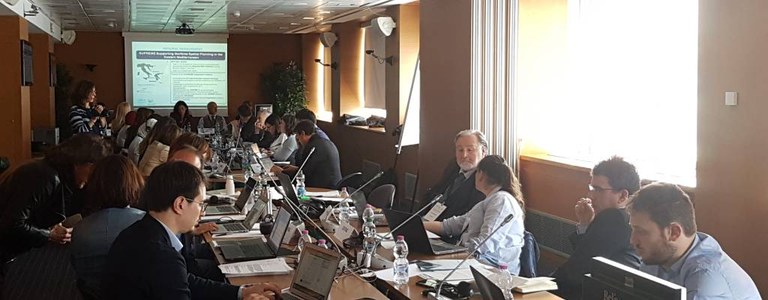
INFO/RAC National Focal Points meeting
The first meeting of INFO/RAC Focal Points was held on 16-17 April 2019 at the INFO/RAC premises in Rome. It was attended by 17 FPs, UN Environment/MAP coordinator, members of the MAP Communication Task Force from PAP/RAC, REMPEC and SCP/RAC, as ...
The first meeting of INFO/RAC Focal Points was held on 16-17 April 2019 at the INFO/RAC premises in Rome. It was attended by 17 FPs, UN Environment/MAP coordinator, members of the MAP Communication Task Force from PAP/RAC, REMPEC and SCP/RAC, as well as a number of members of INFO/RAC staff. Almost all of the first day of the meeting was dedicated to the MAP Operational Communication Strategy which was presented to the participants in detail as a common effort of all the Task Force in the spirit of "Communication as ONE!". A vivid and very fruitfully discussion followed which resulted in several useful and practical suggestions to be taken into consideration. The participants were then divided into three groups with a task to prepare a campaign following instructions contained in the Strategy. All three groups enjoyed the exercise and were very successful in fulfilling the task. The Strategy is now ready for the next step towards adoption.More information..

